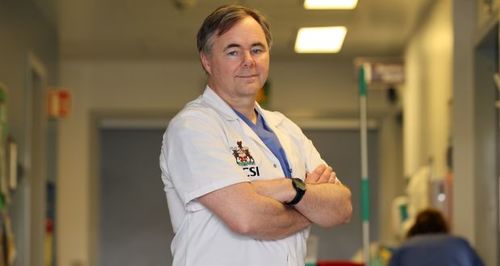Posted on over 5 years ago by Laurentina Kennedy

Acorrd app helps treatment of Covid-19 patients
Web-based tool aids closer monitoring and moved from idea to deployment in 10 days
about 10 hours ago
Kevin O'Sullivan Environment & Science Editor

Prof Richard Costello at Beaumont Hospital: App was developed by respiratory consultants and medtech firm S3 Connected Health. Photograph: Tom Honan
A new web-based app designed by clinicians to help hospitals cope with coronavirus cases is supporting more than 1,000 Covid-19 patients in Ireland after moving from concept to successful deployment in 10 days.
Known as Acorrd – Assessment of Covid-19 Risk of Respiratory Deterioration – it allows closer monitoring of seriously-ill Covid patients, and better anticipation of who might have to go to ICU due to deteriorating breathing difficulties.
It is also making hospital management easier, and ultimately leading to better patient outcomes in many cases. Because of its effectiveness in helping medical teams determine the medical urgency of patients (known as triage), in ongoing monitoring and in treatment, it is being rolled out in acute hospitals.
It was developed by respiratory consultants at the Royal College of Surgeons in Ireland led by Prof Richard Costello at Beaumont Hospital, Dublin, and medtech firm S3 Connected Health with support from the Royal College of Physicians in Ireland.
After being granted a derogation from the Health Products Regulatory Authority and the Department of Health, Acorrd was developed initially at Beaumont Hospital, which has the largest cohort of Covid-19 patients in Ireland.
Three more major hospitals are currently using it, while more than 100 clinicians are piloting its use and, following a Health Service Executive review of clinical benefits, it will be deployed in all hospitals with Covid-19 patients.
Respiratory care
“Ireland’s hospitals are working tirelessly and doing a stellar job at looking after coronavirus patients. However, with the number of cases rapidly increasing, we urgently needed to find a solution which enabled our hospital teams to cope with this crisis by optimising and scaling acute respiratory care delivery for all affected patients,” said Prof Costello.
With additional clinical staff being pulled in from other departments to boost respiratory care teams, “we also needed something to provide clinicians less experienced in this area with the critical knowledge and decision support to care for patients”, he said.
In normal circumstances, Acorrd would take up to a year to develop from concept to deployment, said S3 Connected Health president Jim O’Donoghue.
“However, as these are critical times, we managed to expedite the process . . . and deliver it in less than two weeks, thanks to our outstanding partners,” he added.
‘Digital solutions’
Digital health solutions were becoming a vital part of healthcare, “and the Covid-19 crisis underlines the importance of embracing digital solutions to improve patient outcomes and facilitate more efficient care”, Mr O’Donoghue said.
Acorrd enables clinicians to quickly and appropriately triage Covid-19 patients using the web-based application on their smartphone – and measure patient status – the Covid critical care index (CCCI).
This helps determine the best course of treatment based on key patient vital indicators, including respiratory rate and oxygen-saturation levels in the lungs. It also determines the mode of oxygen delivery.
“CCCI assessments are repeated on an ongoing basis, enabling Acorrd to visualise trends, track disease progression, assist in the early identification of patient deterioration, and provide timely advice to the care team on the appropriate clinical considerations,” Prof Costello explained.
They were also starting to see interesting clinical data, “which is helping us better understand the trajectory of the disease and help plan for future requirements; to have the insight into the progression of this uncharted disease is invaluable”.